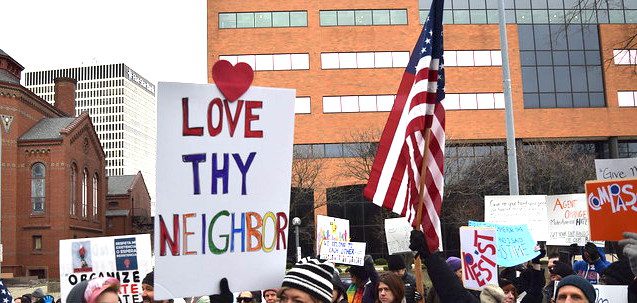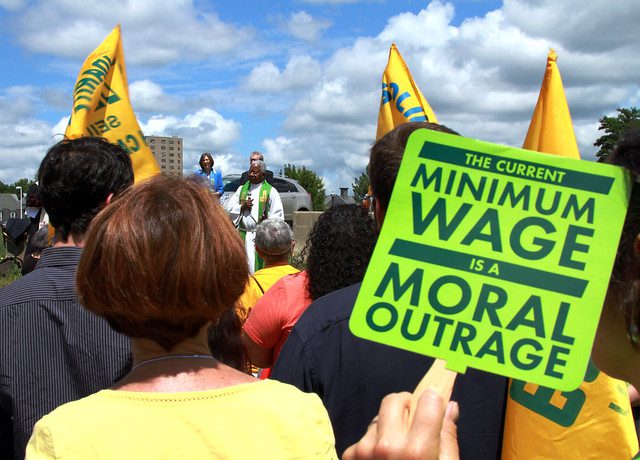
Photo by flickr user freeimage4life, CC0 1.0
The phenomenon of white flight has traditionally followed the narrative that white residents begin to leave an area when they perceive it to be deteriorating due to factors associated with wealth or class—not specifically race—and that most people desire to live in a racially and ethnically diverse community. But through census data and regression analysis, one researcher found that for many white people, that is simply not the case. He concluded that “white residents were more likely to leave relatively well-off neighborhoods than relatively poor ones when Black, Hispanic, and Asian residents began forming a greater share of the population.”
Good things are coming to Buffalo’s historic Fruit Belt community after a moratorium on the sale of city-owned property was lifted recently. The move clears the way for a transfer of up to 20 lots to the F.B. Community Land Trust, according to a Next City article. “If we control the process of who purchases those lots, we will be able to control rents, we will have development without displacement of our residents. That’s what’s key,” said a Fruit Belt resident.
It’s no surprise that talk of affordable housing is becoming more mainstream as the lack of affordable housing options continues to increase for more and more households. At a recent gubernatorial forum in Colorado, discussion about the shortage of affordable housing in the state took center stage. All four Democratic candidates were in attendance; not one GOP candidate was able to join the forum.
Chopping away. In another move to destroy the Consumer Financial Protection Bureau, Mick Mulvaney this week disbanded three of bureau’s advisory boards. It’s getting really difficult to watch the bureau’s slow death.
The reauthorized “Family Self-Sufficiency (FSS) Act” has an interesting caveat we think will be extremely helpful for families. Since its inception in 1990, the FSS program made it so Housing Choice Voucher recipients contributed 30 percent of their income toward rent and utilities while the voucher paid the rest. If a voucher receipt’s income increases, they would be required to pay more for rent. In the newly approved program, households with increasing incomes would be able to deposit their additional rent contributions into a savings account. If a tenant remains employed and does not receive cash assistance for one year, they would be able to access that account. Sounds like a little good news to us. Tenants were also given another protection recently. The “Protecting Tenants at Foreclosure Act” allows renters to remain in their homes for at least 90 days or for the term of their lease if their residence is going through a foreclosure, according to the National Low Income Housing Coalition.
The federal Opportunity Zones program is moving forward and state selections are being finalized and approved by the treasury department. Though it is surely not the only one, the Atlanta neighborhood of Edgewood was recently called out for not needing the designation, as it is undergoing significant developer investment and shows signs of gentrification. Although the state has defended its selection saying the neighborhood has a 30 percent poverty rate, a home recently sold for $900,000. A recent Shelterforce article by Enterprise’s Laurel Blatchford warned of this.
It is hard to know what’s worse—that there are companies that would create timekeeping software that works to avoid paying employees for time they’ve worked—or that there are employers that would purchase this software to use against the people that keep their businesses functioning. As the piece details, the wages of hourly workers, and typically low-wage earners, are absolutely affected by this timekeeping software, which is only growing more popular. We’ve documented wage theft before, but in those cases there is little grey area about the criminality of the theft. With “rounding” and “automatic break reductions,” the process is baked in to company policy.
In Trump’s eyes, our nation is “winning” because of him, but a new independent report from the United Nations finds that the winning doesn’t extend to far too many Americans, and that “contempt for the poor has intensified” under his administration. Visits around the country to communities in places like Puerto Rico, Alabama, and Washington, D.C., highlight the fact that 40 million people in our wealthy nation live in poverty, and over 5 million live in conditions categorized as “Third World.” The report will be presented later this month to the UN’s Human Rights Council, and comes on the heels of the UN’s condemnation of our policy of separating asylum-seeking parents from the children they brought with them.




Comments